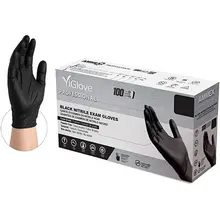Understanding Rubber Gloves
Rubber gloves are essential protective gear in various industries, designed to safeguard hands from hazards. These gloves are made from high-grade materials, offering resilience and durability. Electrical safety gloves, for instance, are specialized for electricians, providing insulation against electrical shocks. Similarly, cleaning gloves and dishwashing gloves are tailored for hygiene and protection from detergents and hot water.
Types and Applications
The versatility of rubber gloves is evident in their range of types. Electrical insulated gloves are crucial for those working with live currents, while long rubber gloves offer extended protection up the arm. In medical settings, black nitrile rubber gloves are preferred for their puncture resistance and hypoallergenic properties. For household chores, rubber gloves for dishwashing are commonly used to protect the skin from moisture and cleaning agents.
Features and Materials
The construction of rubber gloves involves materials like nitrile, latex, and vinyl, each selected for its specific properties. For example, marigold gloves are often latex-based, known for their comfort and flexibility. The design includes features such as textured surfaces for better grip, and elasticity at the wrist for a secure fit. The material composition also ensures that the gloves are soft to the touch, yet robust enough to resist cuts and abrasions.
Advantages of Rubber Gloves
Using rubber hand gloves comes with numerous advantages. They provide a barrier against contaminants, reduce the risk of hand injuries, and improve grip. In electrical work, low voltage gloves and high voltage gloves are indispensable for safety, designed to withstand specific voltage levels. For industrial use, black rubber gloves are beneficial for their ability to conceal dirt and stains, maintaining a professional appearance.
Selection Considerations
When selecting rubber gloves, consider the glove's specific application, the level of protection required, and the fit. Gloves should allow for dexterity and comfort, even during extended use. It's important to choose the right size and material to prevent allergic reactions or discomfort. For tasks requiring precision, dish gloves with enhanced finger sensitivity may be the best choice.
Maintenance and Care
Proper maintenance of rubber gloves extends their lifespan and ensures ongoing protection. After use, gloves should be cleaned according to the manufacturer's instructions and inspected for any signs of wear or damage. Storing gloves in a cool, dry place away from direct sunlight will help maintain their integrity and functionality.
![[GRADE B OFFER] NASTAH latex white rubber gloves good elastic washable reusable hand protection gloves for dishwashing cleaning](https://s.alicdn.com/@sc04/kf/Uc1769b5926ec4b1da7b144f970af39ceJ.png_300x300.jpg)





![[GRADE B OFFER] Kitchen Use Waterproof Latex Pink Household Rubber Gloves Reusable Dish Cleaning Gloves For Dishwashing](https://s.alicdn.com/@sc04/kf/A5f4a4f2f1ea4401dad1be38c7bd6061cD.png_300x300.jpg)


























 浙公网安备 33010002000092号
浙公网安备 33010002000092号 浙B2-20120091-4
浙B2-20120091-4